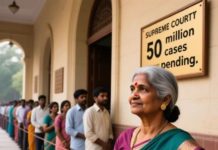MARKET PERSPECTIVE
By J Mulraj
April 12-18, 2025
Structural issues need to be urgently addressed
Image created by Bing
India’s achievements have been stellar. Last week, for example, Government owned Defense Research and DevelopmeNt Organization, DRDO, announced it has developed a 300 KW laser weapon, called Surya, three times faster that Israel’s Iron Beam. DRDO recently successfully tested a glide bomb, called Gaurav, capable of precision bombing. ISRO has successfully developed and tested a cryogenic space engine, making India the sixth country to have that capability, after US, Russia, China, Japan and France. These achievements are, indeed, laudable.
However, PM Modi’s Government needs a course correction to focus greater attention on some basic, structural, issues. Without addressing these, it’s road to be in a ‘developed’ economy would be as bumpy as the lunar surface. Some of these are:
Agriculture: At the Munich Security conference in February, External Affairs Minister Jayshankar, stated, in a panel discussion on democracy, that Indian democracy did, indeed, put food on the table, for 800 million people, providing free food grain to them. Is this, honestly, a bragging point? If, after 75 years of independence, India still needs to support 800 million people (57% of it’s population), there is something gravely amiss in our agricultural policy. As per the 2022-23 Economic Survey of the Government, 65% of the population lives in rural India, and 47% are dependent on agriculture.
Agriculture has a share of 20 % of India’s GDP. So the terms of trade clearly disfavor farmers. This is mainly because wheat and rice are procured with FAQ, or Fair Average Quality specifications, under an MSP, or minimum support price, but the large (politically connected) farmers manage to sell their stock at MSP, whilst the small farmers don’t. Agricultural income is not taxed, so the large farmers have discretionary income and wealth. They are said to walk into luxury car showrooms with sacks of cash and drive away in their new car. As rural areas get urbanised, they benefit from higher prices of farmland, which has shot up. Meanwhile, small farmers (the 47% of population dependent on grain handouts under Government schemes) see their small land holdings shrink with each generation, causing their productivity to drop, to the lowest in the world, because of the small size of farms, too small for mechanisation. Small farmers, too small to get access to bank loans, turn to moneylending sharks, often ending in suicides when crops fail.
The Government tried to modify agriculture policy a few years ago, but was thwarted by, of all things, farmer protests! The policy provided alternatives to farmers to earn a higher income, but they were misled by vested interests (larger farmers and politicians) who were happy with the existing system that enriched them.
The ‘tax exempt income’ for agriculture is meant to protect the small farmer. It’s perverted to help non farmers (politicians, industrialists and professionals) pretend to be farmers, and so use agricultural income to launder their ‘black’ money.
A simple solution would be to limit agricultural income tax exemption to, say, Rs 5.1 million. This is 4 times the exemption limit for non farmers, hence enough to cover all marginal farmers. Beyond Rs 5.1 million, agri income should be taxed as others are. If PM Modi is really serious about curtailing tax evasion, he should bell the cat and implement this.
Primary education: The Annual Status of Education Report, ASER, 2023, which surveyed nearly 35,000 primary schoolchildren, in 26 states found that, for nearly two decades, ASER the children need urgent support in acquiring foundational skills like reading and basic arithmetic. More than a quarter cannot read Standard 2 text fluently in their regional language; more than half struggle with division of 3 digits by 1 digit problems; 57% of students can read sentences in English.
It is shameful that ASER has been warning about students needing urgent help for the past 2 decades! It shows that Governments do not read their reports. The Finance Minister feels that her job is done by increasing budgetary allocation for primary education, but the Ministry of Education ignores recommendations of ASER.
If the state of our primary education is so poor, how will India cope with the huge changes in a technology driven world with humanoid robots, AI, autonomous driving and such? China introduced free markets, and deregulated, in late ‘80s, under Deng Xiaoping, ten years before India, under PM Narasimha Rao, aided by FM Manmohan Singh, did, in 1991. Because of the ten year advantage, China’s economy is 5 times larger, allowing it to dominate India.
Now, we lag behind China in primary education, and thus in preparation for a world led by emerging technological changes. So maybe China, after a few decades, will widen the lead further. If India wants to become a ‘developed’ economy, it must work on it’s primary education first.
Judicial system: The fact that India has a backlog of 5 million cases pending for ten or more years, is well known, with little being done about it. Just like the plight of agriculture causing the Government to give free food grains to over 800 m. people. And just like the poor state of India’s primary education system. Why, then, is there no progress in solving such structural issues?
Last week saw yet another case of misuse of investor funds. SEBI accused the promoters of Gensol Engineering, which provides EPC services to the renewable energy sector, of diverting over Rs 250 m. to family members, who acquired personal assets. Several unresolved cases such as Ponzi schemes, have occurred repeatedly. Government agencies are unwilling to bring the perpetrators to justice, for obvious reasons, and the lethargy of the judicial system permits white collar criminals to go scot free. Unless investigative agencies are pressured, upon penalty of demotion, and the judges remember their solemn oath, that justice delayed is justice denied, such frauds will continue.
India will hit a GDP number, given it’s size and it’s demographic profile, but will not become a ‘developed’ country. A course correction is needed.
In global news Trump’s tariff war hogs the headline. No country, neither buyer (who can’t afford the ridiculously higher price) nor seller, (no goods/service producer has such margins) can pay such tariffs. Anyone with half a brain can see that! So the purpose is to get other countries to go to Trump and genuflect.
Countries like China and Canada are pushing back. China has put rare earth minerals under licensing restrictions. This would impact a lot of industries, including defense and the EV industry. China is also dumping US Treasury securities. Prices of securities went down, so yields went up. That defeated Trump’s purpose, according to one theory. His purpose was to crash the equity markets by starting a tariff war (this happened) so that investors would sell equity and buy US Treasury securities, moving to safety, which, then, would lower yields, making raising debt cheaper (this didn’t happen).
Another interesting ghost rate gif move was the one made by Russia, which offered a supply of rare earth minerals (which China denied), including minerals extracted from occupied Ukrainian territory. President Zelenskyy, of Ukraine, swiftly promised to sign a deal with USA for the same.
Last week the Sensex rose 396 points, to end at 78553.
Markets would settle only after the dust in the tariff war settles. Until then, volatility rules.
Comments may be sent to jmulraj@asiaconverge.com










































COMMENTS